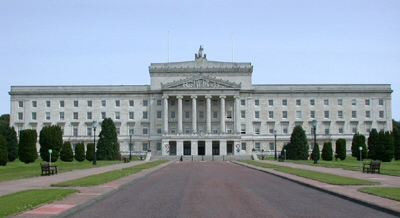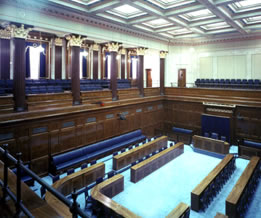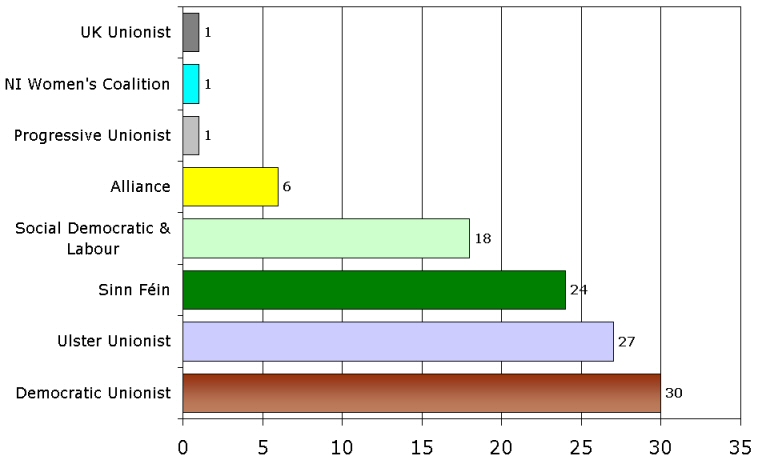 |
 |
An Overview of The Northern Ireland Assembly
5. Suspension
Parliament Buildings in Stormont, location of the Northern Ireland Assembly. It was built in 1932 to house the earlier
Parliament of Northern Ireland (closeded between 1972-99)
 |
 |
Over the years, successive British and Irish Governments have worked closely together to try to bring lasting peace to Northern Ireland, recognising the need for new political arrangements acceptable to both sides of the community. In 1985 an Anglo-Irish Agreement provided a new basis for relations between the UK and the Irish Republic, creating an Intergovernmental Conference in which to discuss issues of mutual interest such as improved cross-border cooperation and security. Within this framework, the British Government continued talks during the early 1990s with the Northern Ireland political parties and separately with the Irish (Republican) Government.
In 1993 the British and Irish Governments signed the Downing Street Declaration, setting out their views on how a future settlement might be achieved and restating the fundamental principle that any constitutional change would require the consent of the majority of people in Northern Ireland. Following the British General Election in May 1997, the new Government confirmed its intention of making the process as inclusive as possible and maintained that any agreement reached would have to have the broad support of the parties representing each of the main communities.
Multi-party (Protestant-Catholic) talks held in Belfast in April 1998 concluded with what became known as the ‘Good Friday Agreement’. Legislation was passed at Westminster authorising a referendum on the settlement in Northern Ireland and permitting elections to a new Northern Ireland Assembly. The Irish Parliament also considered the Agreement and passed legislation authorising a concurrent referendum in the Irish Republic. In May 1998 referendums were held in both parts of Ireland, and the Agreement received a clear support. Northern Ireland voted 71% in favour and 29% against, while in the Irish Republic the result was 94% and 6% respectively.
A new Northern Ireland Assembly of 108 members was elected by proportional representation (not the first past the post system as in England!) in June 1998 and met for the first time the following month. The Westminster Parliament subsequently implemented the whole settlement and formally instituted devolved administrative powers in the Northern Ireland Act 1998. In December 1999 power was devolved to the Assembly and its Executive Committee of Ministers. At the same time the North/South Ministerial Council, North/South Implementation Bodies, British-Irish Council and a new British-Irish Intergovernmental Conference became fully functioning institutions.
However, in February 2000 the Secretary of State for Northern Ireland suspended the operation of the devolved adminitration, owing to a lack of progress being made on decommissioning of illegal weapons - a condition necessary for the complete fulfilment of the Belfast (Good Friday) Agreement by 2001. After further talks, a political settlement was reached and devolved powers were restored to the Assembly and Executive in May 2000. Nevertheless, arms decommissioning has remained a contentious issue, prompting the resignation of the Ulster Unionist First Minister on 1 July 2001 and the appointment of an acting successor.
Following devolution (Dec. 1999), the Secretary of State for Northern Ireland remains responsible for Northern Ireland Office matters not devolved to the Assembly. These include policing, security policy, prisons and criminal justice. The Secretary of State represents Northern Ireland interests in the UK Cabinet and ensures that the devolution settlement works satisfactorily. Northern Ireland elects 18 Members of Parliament (MPs) to the House of Commons and, by proportional representation, three of the 87 UK representatives to the European Parliament (MEPs). Northern Ireland’s 26 local government district councils have limited executive functions. They nominate locally elected representatives to sit as members of the various statutory bodies dealing with, for example, education and libraries, health and personal social services, drainage and fire services.
|
For the purposes of election to the Assembly, Northern Ireland is divided up into 18 constituencies - the same as those used for election of MPs to Westminster. Each constituency elects six representatives on a system of proportional representation. This differs from Westminster elections where each constituency sends a single member (MP) who is elected on a first past the post basis. There are 108 Members of the Legislative Assembly (MLAs). These MLAs belong to 7 different political parties. Under the Belfast Agreement these parties are considered under three different categories. There are 4 Unionist Parties, 2 Nationalist Parties and 1 Centre Party. There is 1 Independent MLA. |
The Assembly meets (if it is not suspended) in Parliament Buildings at Stormont, Belfast, and is the prime source of authority for all devolved responsibilities. It has full legislative and executive powers within this framework, which means it can make laws and take decisions on all the functions of the Northern Ireland departments. At its first meeting in July 1998, the Assembly elected, on a cross-community basis, a First Minister and a Deputy First Minister and appointed ten ministers with responsibility for each of the Northern Ireland departments, which together form the Executive. These 12 ministers make up the Executive Committee, which meets to discuss and agree on those issues which concern the responsibilities of two or more ministers. Its role is to prioritise executive business and recommend a common position where necessary. The Executive’s main function is to plan each year, and review as necessary, a programme of government with an agreed budget. This is subject to approval by the Assembly, after scrutiny in Assembly Committees, on a cross-community basis. The first budget was agreed in December 2000, and in March 2001 the Assembly approved the first Programme for Government which set out the Executive’s plans and priorities for the three years from April 2001. The Programme identified five key areas for action to be taken by the Northern Ireland departments working together and with others: Growing as a Community; Working for a Healthier People; Investing in Education and Health; Securing a Competitive Economy; and Developing North/South, East/West and International Relations.
The Programme for Government will be reviewed on an annual basis.
|
|
(The Assembly has ten Statutory Committees. Membership of Committees is in broad proportion to party strengths in the Assembly to ensure that the opportunity of Committee places is available to all Members. Each Committee has a scrutiny, policy development and consultation role in relation to its department and a role in the initiation of legislation.)
The current state of the parties in the
Assembly, seats

The Assembly has both legislative powers and responsibility for electing the Northern Ireland Executive. The Assembly has authority to legislate in a field of competences known as "transferred matters". Powers reserved by Westminster are divided into "excepted matters", which it retains indefinitely, and "reserved matters", which may be transferred to the competence of the Northern Ireland Assembly at a future date.
|
transferred matters:
|
reserved matters:
|
excepted matters:
|
The Northern Ireland Departments
§
Agriculture and Rural Development§ Culture, Arts and Leisure
§ Education
§ Employment and Learning
§ Enterprise, Trade and Investment
§ Environment
§ Finance and Personnel
§ Health, Social Services and Public Safety
§ Regional Development
§ Social Development
A 60-member Civic Forum was established in October 2000, representing the business, trade union, voluntary and other sectors of the Northern Ireland community. It has a chairperson (appointed by the First Minister and Deputy First Minister) and acts as a consultative mechanism on social, economic and cultural matters.
Since its first day of existence the Assembly has been suspended on four occasions. The most recent suspension occurred when unionists started to walk out of its power-sharing Executive after Sinn Féin's offices at Stormont had been raided by the police investigating alleged intelligence gathering on behalf of the IRA by members of the party's support staff. The Assembly remains suspended, but the persons elected to it at the 2003 Assembly Election were called together on 15 May 2006 for the purpose of electing a First Minister and Deputy First Minister and choosing the members of an Executive (before 25 November 2006) as a preliminary to the restoration of devolved government.
learn more:
Northern Ireland Assembly Official Site
sources:
National Statistics, UK 2002, The Official Yearbook of Great Britain and Northern Ireland
Northern Ireland Assembly Official Site
Wikipedia,
Northern Ireland AssemblyStratagem: Public Affairs and Government Relations
credits:
The text was composed by using the relevant materials of...
1. The Official Yearbook of Great Britain and Northern Ireland © Crown Copyright 2001.
2. The Northern Ireland Assembly © NI Assembly Commission 2003
3. Northern Ireland Assembly © Wikipedia 2006